Medical Gaslighting: Study Reveals 72% of Millennial Females Feel Dismissed by Doctors

Ever left your doctor’s office feeling like your symptoms were overlooked or ignored?
If so, you’re not alone. In our recent study, we learned that 72% of millennial females feel dismissed by their doctor.
This experience is often referred to as “Medical Gaslighting”, which occurs when a patient feels like a medical professional has dismissed or denied their illness; implying that their symptoms are insignificant, not real, or caused by psychological factors.
Over the past year, we’ve seen a number of medical gaslighting stories in the mainstream media. For example, The New York Times recently reported on a case where a female patient’s doctor dismissed her symptoms and failed to identify her “mini-heart attacks” – resulting in the delay of life-saving care.
To shed even more light on this topic, we’ve analyzed and compiled data from three different Mira research studies:
- 2023: Survey of 2000 participants (US, 1120 Female and 880 Male, 18+)
- 2021: Survey of 1000 participants (US, Female, 18+)
- 2023: Email Survey of 117 Female Trying to Conceive
Here’s a deep dive into our research, starting with the key statistics and insights into the underlying causes of medical gaslighting. We’ll then conclude by providing practical advice and prevention strategies for both patients and health organizations.
The Statistics
In our research, we learned that 65% of American women and 60% of men felt like their doctor dismissed, ignored, or minimized the severity of their medical concerns. This percentage is even greater among female millennials, with 72% of respondents feeling ignored or dismissed by doctors.

One patient shared, “I was so weak I could not brush my hair. The doctor told me any woman with seven children should be tired.”
When asked specifically about whether or not they had experienced medical gaslighting, one out of every two respondents (50%) felt that they had experienced medical gaslighting. The majority of gaslighting occurred either with a GP (50%) or in an emergency room (30%), and experiences of gaslighting were reported nationwide.
Top-5 states where Americans (both men & women) feel medically gaslighted: Arkansas, Idaho, Minnesota, Rhode Island and Alabama.
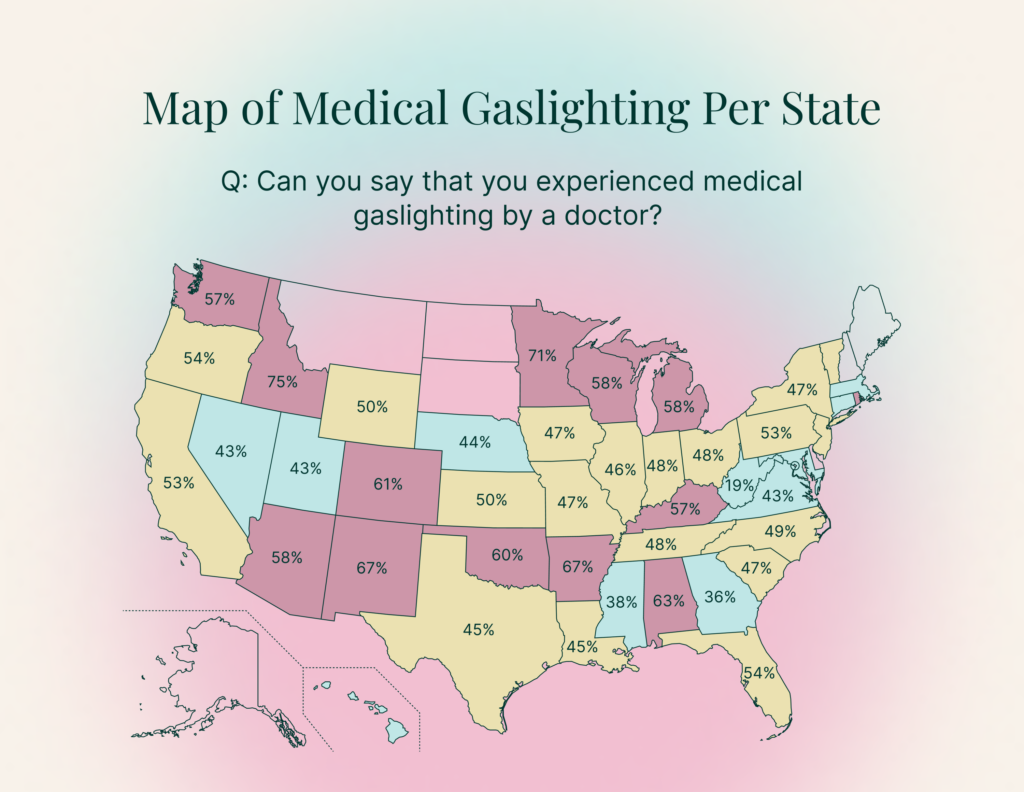
Source: Based on the March 2023 Survey of 2000 participants (1120 Female and 880 Male, US, 18+)
Symptom evaluation
When assessing symptoms, near 2/3 of surveyed women have been told by their doctor that their symptoms were due to stress or anxiety. Another 53% reported they were told that they needed to lose or gain weight in order to get better.
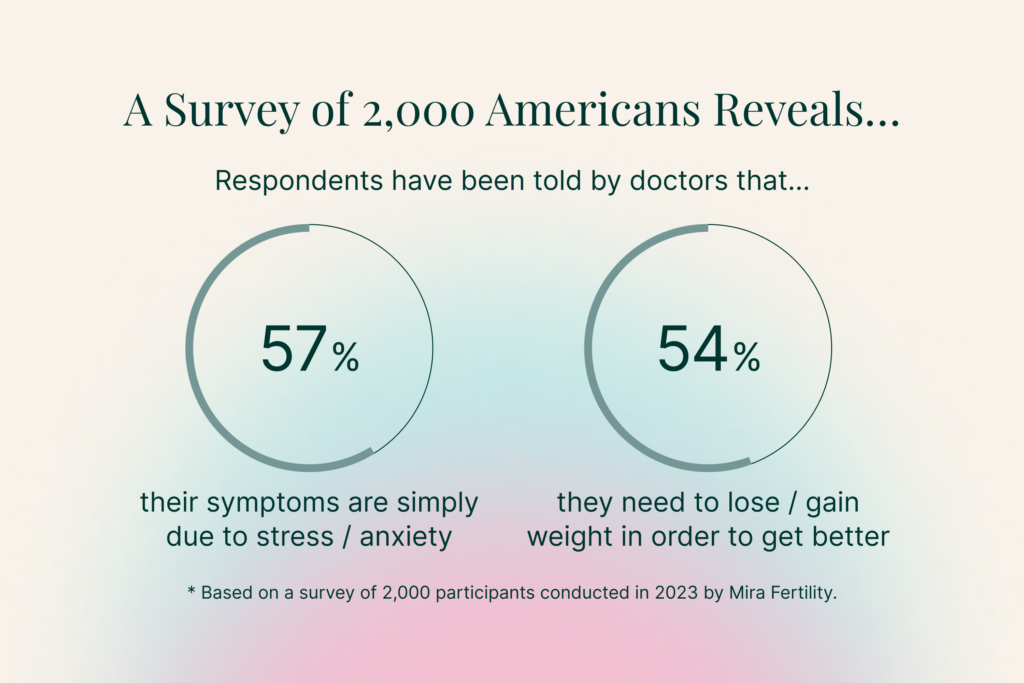
As a result of symptoms being dismissed, 58% of respondents reported that they struggled to get a proper diagnosis or even the opportunity to undergo further testing. 44% of respondents also felt like their medical professional was blaming them for their symptoms or illness, with one patient admitting, “Instead of feeling seen, I feel like a nuisance.”
Source: Based on the March 2023 Survey of 2000 participants (1120 Female and 880 Male, US, 18+)
In our previous 2021 Survey of 1,000 female Americans, 68% reported that they had to “prove” their symptoms to their healthcare provider.
Sentiment among minorities
More than a third (35%) of female participants reported that their experience of medical gaslighting was worsened by their gender, which is twice higher than male patients (16%).
48% of female black respondents say it was more severe because of their race.
Others reported their experience of medical gaslighting was due to their ethnicity (16%), identity (11%), and sexual orientation (6%).
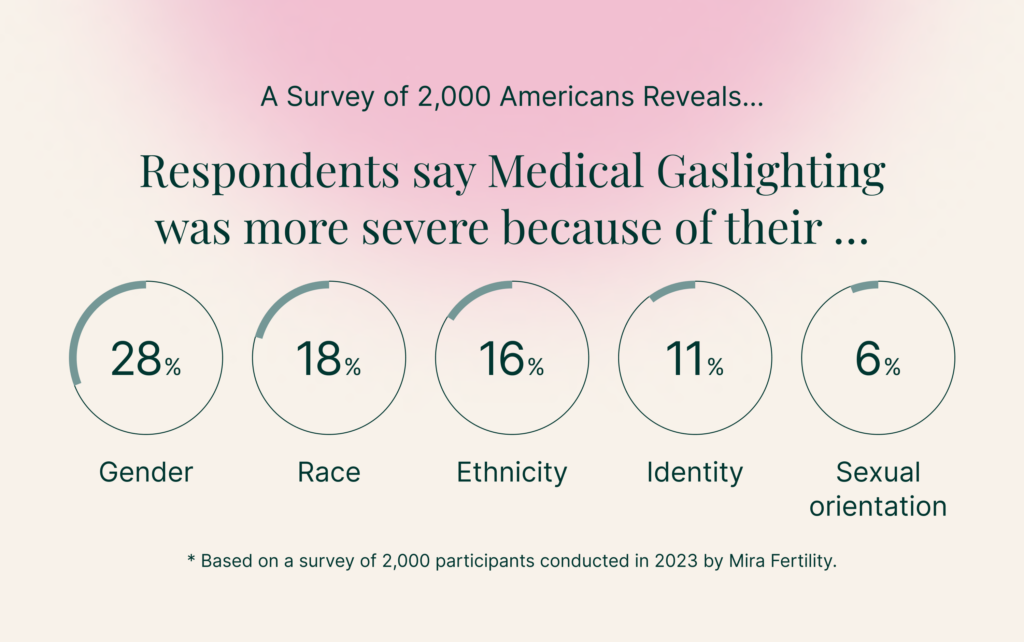
Sentiment among those trying to conceive (TTC)
In our 2023 email survey of women who were TTC, we learned that 70% of respondents believed they had experienced medical gaslighting from a fertility specialist.
Of those respondents struggling to conceive, only 30.5% felt that their doctor properly investigated the underlying cause of why they couldn’t get pregnant, with 56% admitting that they still do not understand why they can’t conceive.
One respondent shared, “After two miscarriages, I was told it was common therefore nothing to investigate until I lose a third child.”
When asked about their doctor’s recommendations, 70.7% reported that their doctor focused on reducing stress and cultivating healthy habits instead of looking into the underlying cause of infertility.
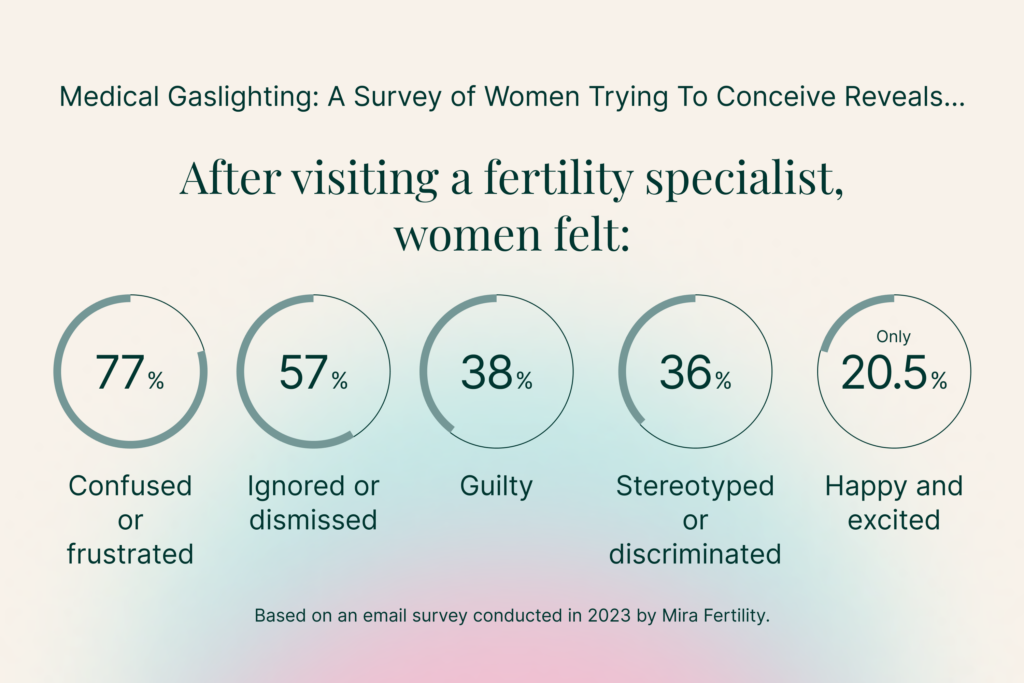
After visiting a fertility specialist, respondents reported they experienced one of the following emotions at least once:
- Confused, frustrated, and unsure of what to do next (76.8%)
- Ignored or dismissed (57.1%)
- Guilty (37.5%)
- Stereotyped or discriminated against (35.7%)
Of all the respondents who visited a fertility specialist, only 20.5% felt happy and excited after leaving their appointment.
Source: 2023 Mira Customer email survey of 117 trying to conceive women.
Coping strategies
We also explored how individuals cope/respond when they feel that their medical concerns are being dismissed.
82% of respondents reported that they turned to the Internet for healthcare advice. More specifically, they turned to the following online platforms:
- Google (90%)
- Facebook (15%)
- Reddit (13%)
- TikTok (11%)
- Instagram (8%)
- Twitter (7%)
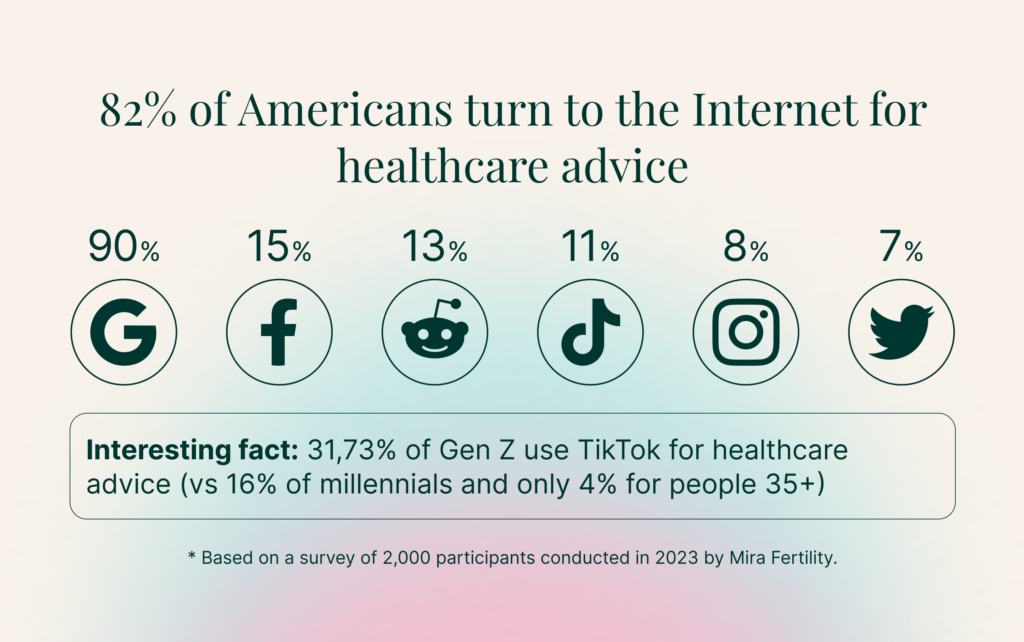
Interestingly, 31.73% of Gen Z respondents turned to TikTok, compared to only 16% of millennials and 4% of individuals over 35. When asked about the trustworthiness of influencers, 28% admitted that they trusted influencers as much or even more than doctors. For Gen Z specifically, that percentage is higher (39%).
Some respondents turned to more extreme measures, with 45% reporting that they changed their primary care provider (PCP) due to not feeling like they received the help that they needed.
Based on the March 2023 Survey of 2000 participants (1120 Female and 880 Male, US, 18+)
Why It’s Happening
So what are the underlying issues? Why do so many individuals feel disconnected and dismissed by their healthcare providers?
Our research suggests part of the problem is patients simply don’t feel comfortable asking questions – especially if they consider their symptoms to be sensitive or embarrassing.
For example, in our 2021 survey of 1,000 women from the US, 50.5% did not want to ask their doctor about changes to their sexual drive. Other topics that respondents did not want to bring up included excessive sweating (50.3%) and mood swings (42.5%).
Of those who did ask their doctor questions about their symptoms, many still felt they did not receive adequate answers. This is evidenced by the 37%, 36%, and 26% of individuals who felt like they did not receive comprehensive information about their changes in sexual drive, excessive sweating, and mood swings, respectively.
Among participants who asked questions about their difficulties with getting pregnant, a third of respondents admitted they felt like they did not receive comprehensive information from their doctor.
When asked why they thought their doctor could not manage to explain the cause of their symptoms, participants placed the blame on a lack of medical tests (49%), lack of women’s health research in general (40%), and only 26% named incompetence/mistake.
A further 64.8% of participants reported that they did not feel involved in the treatment plan that they had been prescribed.

Source: Based on the 2021 Survey of 1000 participants (US women 18+)
Addressing & Preventing Medical Gaslighting
It’s clear that we can do better, and bridging the gap will take effort from all stakeholders – including patients, healthcare providers, and health organizations.
What patients can do
Learn about your body
Thanks to the Internet, we now have access to more information about our bodies than ever before. Use this to your advantage by exploring and learning everything you can about your individual symptoms and how they relate to your health goals.
Researching your symptoms is by no means a replacement for seeking help from a certified medical professional. However, it can help to point you in the right direction for further support – such as tools, support groups, and questions/topic ideas to bring up with your doctor.
Track your health data
Health monitoring doesn’t have to end when you leave your doctor’s office. In fact, there are lots of different tools you can use to track key elements of your health in your daily life.
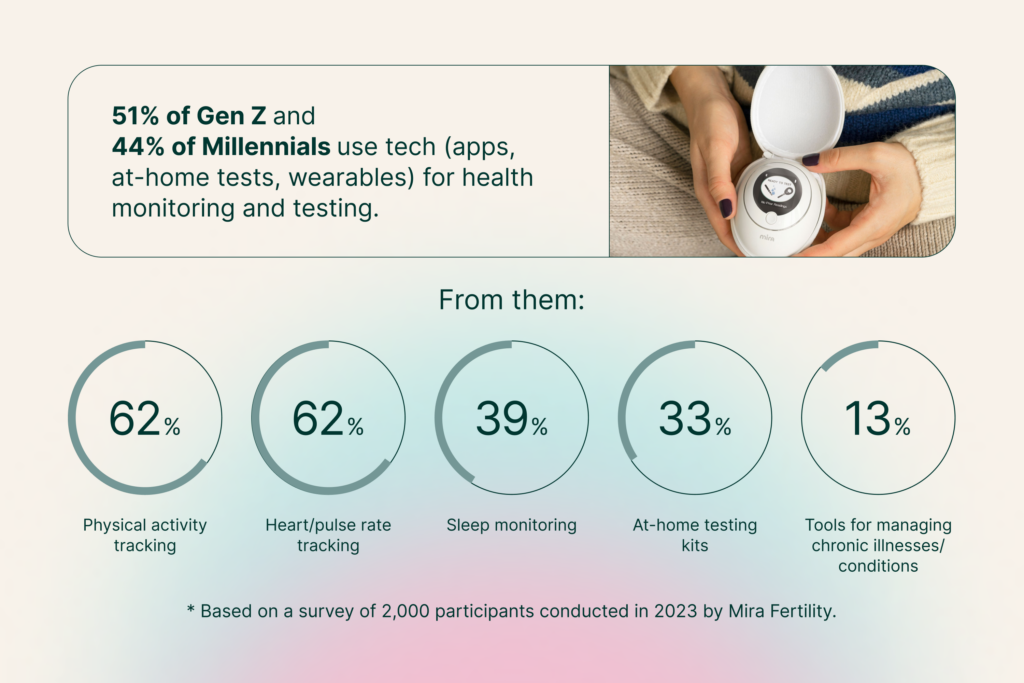
We estimate that 51% of Gen Z and 44% of Millenials are already using apps, at-home tests, and wearables for:
- Physical activity tracking (62%)
- Heart/pulse rate tracking (62%)
- Sleep monitoring (39%)
- At-home testing (33%) – like Mira Hormone Monitor
- Chronic illness/condition management (13%)
Remember – data is stronger than words. The more data you have about your health, the better equipped you will be to have a productive conversation with your doctor.

Based on the March 2023 Survey of 2000 participants (1120 Female and 880 Male, US, 18+)
Advocate for yourself
When it comes to our personal health, we should all feel confident and empowered to be our own advocates. There is no shame in asserting yourself by asking plenty of questions, expressing any concerns, and seeking second opinions when your gut tells you something is “off”.
What health organizations and brands can do
Provide training and tools
Whether it’s providing training programs for healthcare providers or running awareness campaigns for patients, there are a ton of different activities organizations can do to proactively prevent medical gaslighting.
In addition to education and awareness, another piece of this puzzle is creating tools (or providing access to tools) that help individuals collect and share health data with their doctors.
For example, in our research among women, we learned that 52% of respondents felt that being able to track their treatment progress would help them feel more involved. When asked about hormone tracking, 83.8% reported that they would like to track their hormone levels by themselves.
Based on the 2021 Survey of 1000 participants (US women 18+)
Helping to improve this process will not only help patients feel more involved in their treatment, but it will help doctors make better decisions.
Help close the gender gap in health research
It’s no secret that there is a gender gap in health research, with females remaining underrepresented in the vast majority of medical research/studies.
Health organizations can be part of the solution by prioritizing investment in female health research. Part of this process will likely involve improving organization-wide representation and diversity. This will help to ensure that those from diverse backgrounds are well-represented in all aspects of organizational research and activities.
Fostering healthy doctor-patient relationships
It’s easy to assume that more technology will lead to the doctor-patient relationship becoming less personal – but this is a common misconception. Technology is a way for patients to get even more involved with their health, which should empower doctors to provide more personalized and compassionate advice to patients.
Health organizations should continue to facilitate environments that are open, honest, and patient-first, where patients are encouraged to ask questions and voice their concerns without feeling judged or dismissed.
Final thoughts
Medical gaslighting is more than just a buzzword. It’s a real phenomenon experienced by patients across the board – but we believe there is hope.
Take the Quiz!
Tell us your fertility goal and we'll give you a perfect product match
At Mira, we are committed to bridging the gap between patients and doctors by providing a tool where patients can measure and track real-time hormone data. If you’re interested in learning more about our work, we welcome you to check out the following resources:
To learn more about general fertility health, well-being, and hormones, check out our regularly updated library of blog articles and ebooks.
Mira’s Editorial Process
All content produced by Mira meets stringent editorial standards, ensuring excellence and accuracy in language and medical precision. Every piece undergoes thorough fact-checking and review by qualified professionals. Check out our full editorial process to learn more.













